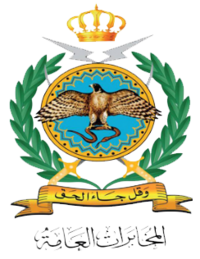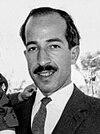General Intelligence Department (Jordan)
| دائرة المخابرات العامة | |
 Official Seal of the GID | |
| Agency overview | |
|---|---|
| Formed | 1964 |
| Preceding agency |
|
| Headquarters | Amman, Jordan |
| Annual budget | Classified |
| Agency executive |
|
| Website | http://www.gid.gov.jo |
Jordanian General Intelligence Department, GID or Mukhabarat (Arabic: دائرة المخابرات العامة) is the primary civilian foreign and domestic intelligence agency of the Hashemite Kingdom of Jordan. The GID is reportedly one of the most important and professional intelligence agencies in the Middle East;[1] the agency has been instrumental in foiling several terrorist attacks both in Jordan and around the world.[2]
Law and establishment
[edit]Before establishing GID, the department was known as the General Investigation Department (دائرة المباحث العامة) from 1952 to 1964.
GID was established in accordance with Act 24 of the year 1964 which went through all its constitutional stages.
The GID Director is appointed by royal decree, itself the result of a decision made by the Council of Ministers. On January 2, 2009, King Abdullah II replaced Muhammad Dahabi (brother of Nader Dahabi) as director with General Muhammad Raqqad, the former GID director.[3] In 2012, Muhammad Dahabi was sentenced to 13 years imprisonment. Officers are also appointed by royal decree upon the recommendation of the Director-General; they all have university degrees in different majors and must go through a thorough security check before joining the service.
The duties of the GID is specified in law and consists of protecting the internal and external security of the Kingdom through carrying out necessary intelligence operations and executing duties assigned by the Prime Minister in writing.
Mission
[edit]As quoted from the official GID Site, their mission is
to contribute to the safeguarding of the Kingdom and the Nation under the Hashemite leadership of His Majesty King Abdullah II bin al Hussein, as well as protecting the freedoms of the Jordanian people and preserving a democratic form of government. It is our objective to share with others the responsibility of building the proper grounds that leads to create an environment of security and stability, which will reflect prosperously on all sectors of the Nation, providing the confidence to all types of local and foreign investors to operate in a reliable and secure atmosphere.
In practice, the agency is notoriously known for its extensive activity in Jordan and throughout the Middle East, as well as its cooperation with American, British, and Israeli intelligence. Through a complex spying system, it plays a central role in preserving stability in Jordan and monitoring seditious activity. The GID is believed to be the CIA's closest partner after MI6. The GID enjoys good relations with the Mossad, Israel's intelligence agency,[4] but relations temporarily soured in 1997 after a Mossad attempt to assassinate Hamas leader Khaled Mashal in Amman.
History
[edit]The GID was the main force behind maintaining Jordan's stability in the years after Black September, thwarting numerous terrorist plots. Even before the 9/11 attacks, the Jordanians had become key partners in the war on terror. In 1999, tips from the Mukhabarat alerted the CIA to plots by Bosnia-based terrorists against U.S. targets in Europe.
At the dawn of the new millennium, Jordanian Intelligence uncovered a large-scale terrorist plan to attack dozens of hotels across Jordan and the United States. Jordan immediately relayed the information to Washington and the attacks were thwarted in both countries. The GID warned the United States of the impending 9/11 attacks. In late summer 2001, Jordanian intelligence intercepted a message implying that a major attack was being planned inside the US and that aircraft would be used. The message also revealed that the operation was codenamed "Big Wedding", which indeed turned out to be the codename of the 9/11 plot. The message was passed to US intelligence through several channels.[5]
As many as 100 al Qaeda prisoners have passed through the Mukhabarat's Al Jafr prison in the southern desert. Among them are some of the biggest catches in the war on terror: Al Qaeda operations head Khalid Shaikh Mohammed and Persian Gulf chief Abd al-Rahim al Nashiri.[2] The reliance of US intelligence on its Jordanian counterpart was forged in part by both countries’ aversion to Islamic radicalism. Their collaboration is believed to have helped quell the Al-Qaeda insurgency in Iraq and eliminate terrorist masterminds such as Abu Musab al Zarqawi.[6]
The first director of the GID is Mohammad Rasoul Al-Kailani in 1964 and the current director is General Ahmad Husni.
On June 6, 2016, at 4:00 GMT, on the first day of the month of Ramadan, three GID officers were killed in an attack in the refugee camp located outside of Amman.[7][8] The suspect was identified as Mahmoud Masharfeh. According to Al Jazeera, Masharfeh had been imprisoned between 2012 and 2014 for attempting to enter Gaza and join a group fighting Hamas. A source who was close to the suspect while he was in prison claims that Masharfeh has been trying to join ISIL and it is unknown whether he was able to.[9] Soon after the attack Masharfeh was arrested.[10]
Directors
[edit]| No. | Portrait | Director of Jordanian General Intelligence | Took office | Left office | Time in office | Ref. |
|---|---|---|---|---|---|---|
| 1 | Brigadier General Mohammad Rasoul Al–Kailani (1933–2003) Founder and First Director of Jordanian Intelligence | 1964 | 1968 | 3–4 | [11][12] | |
| 2 | Major General Mudar Badran (1934–2023) | 1968 | 1970 | 1–2 | [13] | |
| 3 | Brigadier General Natheer Rshaid (1929–2024) | 1970 | 1974 | 3–4 | [14] | |
| 4 | Lieutenant General Ahmad Obeidat (born 1938) The Longest-Serving Intelligence Director | 1974 | 1982 | 7–8 | [15] | |
| 5 | Brigadier General Tariq Alaa El-Din (1935–2024) | 1982 | 1989 | 6–7 | [16] | |
| 6 | General Mustafa Al-Qaisi (1938–2019) | 1989 | 1996 | 6–7 | [17] | |
| 7 | Lieutenant General Sameeh Al-Bateekhi (born 1943) He received a 4-year prison sentence in 2003. | 1996 | 2000 | 3–4 | [18][19] | |
| 8 | Marshal Sa'ad Khair (1956–2009) The only director of Jordanian intelligence to have achieved the rank of field marshal, and he is one of the five who hold this rank in Jordan. | November 2000 | May 6, 2005 | 4–5 | [20] | |
| 9 | Major General Samih Asfoura The Shortest Term for a Director of Intelligence | May 6, 2005 | December 20, 2005 | 228 days | [21] | |
| 10 | Brigadier General Mohammad Al-Dhahabi He received a 13-year prison sentence in 2012 and was released in late 2023. | December 20, 2005 | December 29, 2008 | 3 years, 9 days | [22] | |
| 11 | Brigadier General Mohammad Al-Raqqad (1965–2020) | December 30, 2008 | October 17, 2011 | 2 years, 291 days | [23] | |
| 12 | General Faisal Al-Shoubaki (1952–2020) | October 17, 2011 | March 30, 2017 | 5 years, 164 days | [24] | |
| 13 | Lieutenant General Adnan Al-Jundi | March 30, 2017 | May 1, 2019 | 2 years, 32 days | [25] | |
| 14 | Brigadier General Ahmad Husni Hatoqai | May 1, 2019 | Incumbent | 5 years, 204 days | [26][27] |
Emblem
[edit]
- The Crown: The Hashemite Royal Crown represents the Constitutional Monarchy.
- The Olive Wreath: Two branches of olive symbolizes prosperity, welfare, and peace.
- The Shield: An Arabic Islamic shield carved on it 25 gates marking independence day, May 25, it also symbolizes defending the security of the nation and safeness of the Home Land.
- The Eagle: One of the country's powerful birds, symbolizes power, invulnerability and having control over the target.
- The Snake: Symbolizes the invisible enemy either internal or external.
- The Two Swords: Two Arabian Swords crisscrossing behind the shield, symbolizing the use of power against terrorism, evil and corruption.
- The Ribbon: A ribbon with the Quranic verse "say that justice has prevailed" which represents truth and seeking to implement it. It also represents the base that the two swords and the two olive branches are settling on.
- The Two Lightning Bolts: The two lightning bolts represent the name of one of their special forces. The two lightning bolts also symbolize the swiftness and accuracy of the General Intelligence Department.
See also
[edit]References
[edit]- ^ "Jordan emerges as key CIA counterterrorism ally". washingtonpost.com.
- ^ a b "USNews.com: In the desert, a secret Jordanian prison for terrorist detainees (6/2/03)". www.usnews.com. Archived from the original on 22 November 2005. Retrieved 15 January 2022.
- ^ Barari, Hassan (2009-01-22). "Jordan's Intelligence Chief Sacked: New Policy Toward Hamas?". The Washington Institute for Near East Police. Retrieved 2009-01-23.
- ^ Bruce Tefft (11 November 2005). "[osint] "Clandestine Ties to Jordan Aid CIA Operations in Middle East"". mail-archive.com.
- ^ They Tried to Warn Us Archived 2021-09-30 at the Wayback Machine HistoryCommons.org
- ^ TheNational.ae, "US and Jordan intelligence services pay the price of secrecy"
- ^ "Jordan intelligence agents killed outside Baqa'a camp". www.aljazeera.com. Retrieved 2016-06-06.
- ^ "Three Jordanian intelligence officers killed in attack in Palestinian camp". Reuters UK. Retrieved 2016-06-06.[dead link]
- ^ "Three Jordanian intelligence officers killed in attack in Palestinian camp". Reuters UK. 7 June 2016. Archived from the original on June 7, 2016. Retrieved 2016-06-15.
- ^ "Arrest made in killing of Jordan intelligence agents". www.aljazeera.com. Retrieved 2016-06-15.
- ^ "Maj. Gen. Mohammed Rasoul Al-Kilani". psd.gov.jo. Retrieved 2024-05-24.
- ^ "King Hussein of Jordan: A Political Life 9780300142518". dokumen.pub. Retrieved 2024-05-24.
- ^ "Former Jordanian PM Mudar Badran Passes Away". english.aawsat. Retrieved 2024-05-24.
- ^ "Royal Court Chief Attends Funeral of Former Interior Minister". petra.gov.jo. Retrieved 2024-05-24.
- ^ "H.E. Ahmad Obeidat". Obeidat Law. Retrieved 2024-05-24.
- ^ "Salama writes: Matt Zeina Knights Tariq - Jordan Vista". vista.sahafi.jo. Retrieved 2024-05-24.
- ^ Jbour, Hani Al (2022-04-21), "10 Jordan", Intelligence Communities and Cultures in Asia and the Middle East, Lynne Rienner Publishers, pp. 163–176, doi:10.1515/9781626378957-010, ISBN 978-1-62637-895-7, retrieved 2024-05-24,
Mustafa al-Qaisi, who was appointed after his dismissal from the General Security to be assigned as a Director General, who is normally appointed by the king, in 1982.
- ^ "Countries at the Crossroads 2006 - Jordan". Refworld. Retrieved 2024-05-24.
- ^ "المخابرات الأردنية تخفض سجن مديرها السابق لأربعة أعوام". الجزيرة نت (in Arabic). Retrieved 2024-05-24.
- ^ "Jordan: Living in the Crossfire 9781350220928, 9781842774700, 9781842774717". dokumen.pub. Retrieved 2024-05-24.
- ^ "Jordan gets new intelligence chief". Al Jazeera. Retrieved 2024-05-24.
- ^ "الذهبي ثاني مدير مخابرات بالسجن". الجزيرة نت (in Arabic). Retrieved 2024-05-24.
- ^ "Jordan at the brink, again". December 30, 2008.
Presumably his replacement, Mohammed Raqad -- whose prior assignment was in the northern city of Irbid -- will have fewer ideas about outreach to Hamas.
- ^ "King bestows Al Nahda medal on intelligence chief". Jordan Times. 2014-06-10. Retrieved 2024-05-24.
- ^ "King appoints new intelligence chief, orders changes". Jordan Times. 2017-03-30. Retrieved 2024-05-24.
- ^ "Maj. Gen. Ahmad Husni appointed as head of intelligence department". Jordan Times. 2019-05-02. Retrieved 2024-05-24.
- ^ "Royal Decree appoints Husni as new intelligence chief". 2019-05-02. Retrieved 2024-05-24.
External links
[edit]- GID.gov.jo - The official website of the GID







